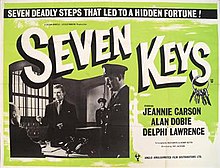Seven Keys is a 1961 British second feature[1] crime thriller directed by Pat Jackson and starring Alan Dobie.[2] The screenplay was by Jack Davies and Henry Blyth.
| Seven Keys | |
|---|---|
 UK quad poster | |
| Directed by | Pat Jackson |
| Written by | Henry Blyth Jack Davies |
| Produced by | Leslie Parkyn Julian Wintle |
| Starring | Alan Dobie Jeannie Carson |
| Cinematography | Ernest Steward |
| Edited by | Lionel Selwyn |
| Music by | Alan Clare |
Production company | |
| Distributed by | Anglo-Amalgamated Film Distributors (UK) |
Release date |
|
Running time | 57 minutes |
| Country | United Kingdom |
| Language | English |
Plot
editRussell is a convict who is bequeathed a set of seven keys by a fellow prisoner. After discovering that the deceased was an embezzler who stole £20,000 that was never recovered, on his release Russell sets out to find the cash. However, he must first solve the mystery of which locks the keys fit, and run the gauntlet of the police and a number of gangsters who are after him and the money. He enlists the reluctant assistance of the embezzler's former secretary, and uncovers a blackmail scheme that explains where the money went.
Cast
edit- Alan Dobie as Russell
- Jeannie Carson as Shirley Steele
- Delphi Lawrence as Natalie Worth
- John Carson as Norman
- John Lee as Jefferson
- Anthony Nicholls as prison governor
- Robertson Hare as Mr. Piggott
- Fabia Drake as Mrs. Piggott
- Alan White as prison warder
- Colin Gordon as Mr. Barber
- Peter Barkworth as estate agent
- Barbara Evans as Freddy's wife
- John Horsley as police Sergeant
- Jeremy Lloyd as Freddy
- Timothy Bateson as bank teller (uncredited)
- Victor Brooks as discharging officer (uncredited)
- Philip Locke as Norman's thug (uncredited)
Critical reception
editThe Monthly Film Bulletin wrote: "The mechanically contrived plot gets an understated and sometimes wryly humorous treatment from director Pat Jackson. The suspense is mild at best, but the adroit playing of Alan Dobie and Jeannie Carson gives the film an air of casual nonchalance that is rather refreshing."[3]
TV Guide described it as a "well-worn crime picture ...A tame entry directed by former World War II documentarian Jackson, whose later works failed to make any impact on audiences".[4]
Britmovie wrote: "Pat Jackson, who made his name with such wartime documentaries as Western Approaches [1944], intelligently directed this ingenious low-budget crime drama."[5]
References
edit- ^ Chibnall, Steve; McFarlane, Brian (2009). The British 'B' Film. London: BFI/Bloomsbury. p. 150. ISBN 978-1-8445-7319-6.
- ^ "Seven Keys". British Film Institute Collections Search. Retrieved 3 December 2023.
- ^ "Seven Keys". Monthly Film Bulletin. 29 (336): 95. 1962 – via ProQuest.
- ^ "Seven Keys | TV Guide". TVGuide.com.
- ^ "Seven Keys | Britmovie | Home of British Films". www.britmovie.co.uk. Archived from the original on 25 February 2012.
External links
edit- Seven Keys at IMDb
- Seven Keys at BritMovie (archived)